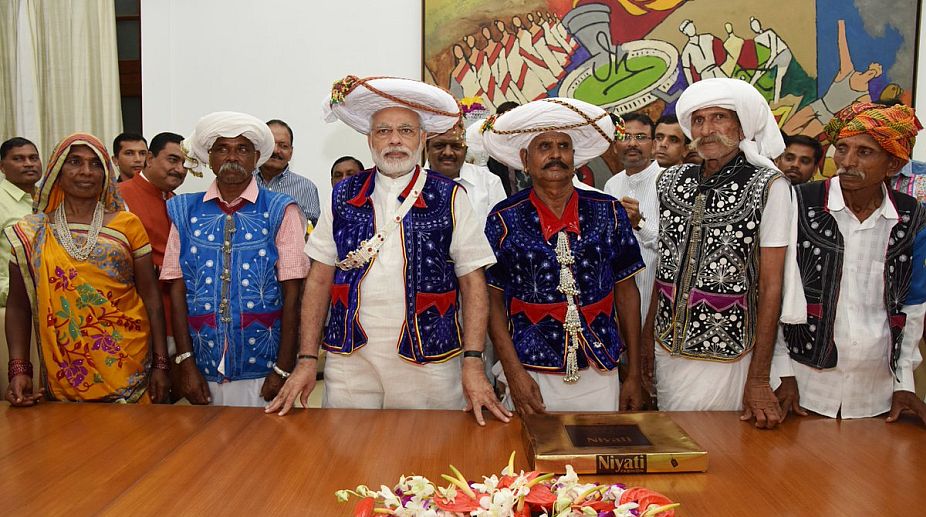NOTA gets 2.5 times more votes than AAP in Gujarat
NOTA (None of the Above) option got 2.5 times more votes than the Aam Aadmi Party (AAP) in the 29…

(Photo: Twitter/file)
In the upcoming Gujarat Assembly elections, the Congress and the BJP have been vehemently trying to woo voters of all sections of society. However, only new faces representing Patidars, OBCs and Dalits have stolen the limelight and tribals are still faceless.
A look at the electorate distribution in Gujarat throws a different light at the issue. The approximate vote percentage in Gujarat for OBCs is 40%, Thakors 20%, Patidars 12.3 %, Dalits 7%, Schedule Tribes 15% and others, including Muslims, comprise about 6%.
Advertisement
After PAAS (Patidar Anamat Andolan Samiti) leader Hardik Patel launched an agitation over reservation, he carved an image of a strong young Patidar leader. A large number of Patidars from across the state had gathered to support Hardik and he instantly became a household name.
Advertisement
During the Patidar agitation, another name surfaced, who raised his voice against the Patidars demand for reservation. He is Alpesh Thakore, who is also the chief of Gujarat Kshatriya-Thakor Sena (GKTS). The 40-year old became the OBC Ekta Manch leader and has been working towards the upliftment of the OBC community. He rose to prominence after the Patidar agitation. Recently, after the Congress Party agreed to meet the demands of the community, he joined the party. It is being speculated that Alpesh might be given a few seats by the Congress to contest in the election.
In 2016, Gujarat saw the Dalit uproar, when the members of the cow protection group attacked Dalits in Una village in Saurashtra. Jignesh Mevani held a protest march by the name Dalit Asmita Yatra from Una to Ahmedabad and emerged as a promising Dalit leader who demanded land for the Dalits. He became the Convener of the Rashtriya Dalit Adhikar Manch and has assured to support the Congress Party in the upcoming Gujarat Assembly Elections. The Congress too has been supportive. Mevani had earlier denied joining or supporting the Congress, however, after Congress agreed to his demands for the Dalit community, he agreed to support the party.
So, the feeling now among the tribal community is the need to have a strong leader who could represent them, like Hardik, Jignesh, and Alpesh. There are so many deep-rooted issues that the community faces, but they do not have anyone to look up to who could help them in raising their concerns at the state level. They have strongly felt the need for a leader, especially after the Patidar agitation.
The previous election analysis and population census suggest, that tribals have a sway on as many as 27 seats out of the total of 182 seats in Gujarat Assembly. In 2012 election results gave 16 seats out of the 27 tribal dominated seats to Congress, which is about 60% success rate for the Congress for these specific seats. But despite being a good vote bank, the tribals feel that they have not been given their rightful dues.
The tribes have not been granted land, which has forced them to farm on forestland. This has led to forestland being encroached upon by many in absence of legal paperwork. They are not equipped to carry on paperwork due to poor literacy levels. Most of the Tribals don’t even have a Scheduled Tribes Certificate making it all the more difficult for them to fetch jobs or apply for jobs under the Scheduled Tribes quota. There are 29 notified Scheduled Tribes in the state. The issue is that there is no unity among them, and they have internal feuds.
What role will the tribal community play in the upcoming Gujarat Assembly Elections is what we are yet to see. Currently, there is a lot of unrest among the Adivasis as the benefits of their reservation is being misused by the non-Adivasi communities.
But they certainly can make or mar the chances of candidate at least in 27 constituencies if they vote en masse.
Advertisement